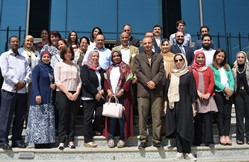 27 September 2016 -- A training of trainers workshop on the development of policy briefs was conducted from 20 to 22 September 2016, aiming to build national capacity for the development of policy briefs that are needed to enable translation of available research evidence to support sound health policy-making, particularly in low- and middle-income countries.
27 September 2016 -- A training of trainers workshop on the development of policy briefs was conducted from 20 to 22 September 2016, aiming to build national capacity for the development of policy briefs that are needed to enable translation of available research evidence to support sound health policy-making, particularly in low- and middle-income countries.
The workshop was held in response to recommendations of the Eastern Mediterranean Advisory Committee for Health Research in its recent meetings in February 2014 and July 2015 to support Member States in further developing a culture of evidence-based health policy-making through knowledge translation, including preparation of policy briefs.
The main goal of the workshop was to prepare a core of trainers who can raise awareness about evidence-informed policy- making, including knowledge translation tools and building capacities on preparing evidence briefs and convening stakeholder dialogues. Such core trainers are expected to further train national officers assigned to develop policy briefs in their home countries.
The specific objectives of the workshop were to:
- share updated information and skills about knowledge translation mechanisms;
- provide hands-on training on preparation of policy briefs, based on national research evidence; and
- discuss examples of best practices of preparation and utilization of policy briefs.
It has been proven that poorly-informed decision-making is one of the reasons why services sometimes fail to reach those most in need, why health indicators are not met and why many countries have been unable to meet their health development goals. Consequently, incorporating evidence as an input into the policy-making processes allows policy- and decision-makers make better-informed decisions that could strengthen public health systems and improve a population’s health. Building evidence-based policy briefs brings together global, regional and local research evidence to inform deliberations and policy-makers about health policies and programmes. The policy briefs thus describe policy problems and summarize best available evidence for the magnitude, underlying causes and different potential impacts of health-related problems along with key options for addressing them, and potential barriers to implement such options. Evidence-informed policy-making promotes a culture of regular and systematic use of evidence in decision-making, which supports successful policy implementation.
The workshop included 35 participants from 12 countries (Bahrain, Egypt, Jordan, Islamic Republic of Iran, Lebanon, Libya, Oman, Pakistan, Palestine, Saudi Arabia, Sudan, and Tunisia), as well as staff from the WHO Regional Office. As an outcome of the workshop participants drafted policy briefs for important national problems, and discussed a road map for the future of training on policy briefs in the Region.








